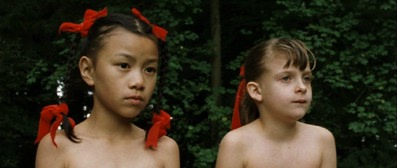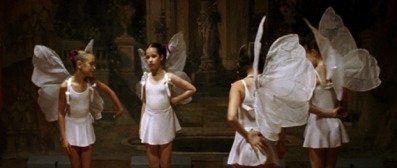|
Any
film that starts off with the sort of bass rumble on the
soundtrack that suggests David Lynch has dropped round
for tea is usually guaranteed to get my attention. It's not the
only link with Lynch, as it happens – later on there is a performance
to an unseen audience on an old theatrical stage with a
squeaky, hand-turned curtain mechanism looks almost like
a melding of a memorable set from Eraserhead
with the colour scheme of The Grandmother,
while the odd bouts of faltering electricity are almost a trademark
of that director's work. But that's where the similarities
end – Lucile Hadzihalilovic's debut feature (unless you
count the 1996 La Bouche de Jean-Pierre,
which at 52 mins is really a long 'short' film) is true to its title
and not an examination of the darker reaches of the soul,
and its preoccupation with nature sits in direct opposition to
Lynch's beloved industrial landscapes.
It's
an intriguing beginning all round, with its uninhabited woodland
landscapes and deserted underground tunnels suggesting
a tale in which nature itself is host to dark and possibly
man-made secret. Well, maybe... The setting is an all-girls
boarding school located in an unspecified forest at an undetermined
point in time, to which girls arrive at the age of six and leave
when they reach puberty. They are delivered to the school
in coffins and emerge in a state of complete disorientation, unaware
of how they got there and confused by their surroundings.
They have no contact with the outside world and are unable
to leave the grounds of the school during their time there.
They play, they learn to dance, they are taught the importance
of obedience, and eventually they leave, but to where?

The
film covers the entire period of attendance at the school
by moving its focus from girl to girl, starting with new
arrival Iris and ending with graduate Bianca. There is little
narrative in the traditional sense of the term, what story
there is being largely symbolic and of secondary importance
to the mood and sense of place and being. The film observes
(but rarely comments on) the nature of childhood innocence
and the changes that a child undergoes on the journey to young womanhood, reflected
in the intermittently symbolic use of butterflies – a teacher is seen pinning them to a board in one scene,
a reflection of the rigid control exercised over her pupils,
and later shows them a pupa giving birth to an adult butterfly
and sets it free, a symbol of the girls' own impending bodily
changes and eventual release.
With
explanations in very short supply, we are encouraged to
speculate not just on the nature of the school, but what
it represents. Are we talking metaphysical or metaphorical?
Aspects of the opening scenes suggest the former, but later
this appears to be a deliberate misdirection by an element
whose only purpose in the film is to misdirect. We are given
an explanation of sorts, but by then most should have worked
out where they are in allegorical terms. The
final scene both confirms your suspicions and remains enigmatically
(and perhaps frustratingly) vague, but like the climax of
Mamoru Oshii's extraordinary Avalon, it
manages to somehow make sense without making literal
sense, and feels like a conclusion without actually
playing like one.
That
opinion has been split on the film is hardly surprising
and it's easy to appreciate both viewpoints. Gorgeously
shot by Benoît Debie and creating an astonishing sense
of a reality infused with fairy-tale ambience, it looks,
feels and plays quite unlike anything you'll see all year,
and in some ways acts as a partially blank canvas onto which
the viewer (and especially reviewer) can project their own
experiences or feelings about the nature of innocence. But
it's this very aspect that will also lead to charges involving
emperors and new clothing, a surface layer so rich that
it encourages readings of content that may not actually
be present – it feels significant, therefore it must be.
Support is leant to this view by the film's overlength,
resulting in a padded midsection in which the girls go about
the everyday business of the school in resolutely non-dramatic
fashion and with no real sense of story or character progression.
But
in a work that rejects formal narrative in favour of mood
and suggestion, and especially one as exquisitely atmospheric
as Innocence, it seems a little unreasonable
to start expecting story and character arcs in the Hollywood
mould. It does sag a tad in the middle, and there is occasionally
the temptation to bark out "Get to the point!",
but much of it is genuinely if abstractly compelling and
suggestive enough to keep first-timers guessing for at least
a good part of its length. It's never as sinister as the
opening chords and images suggest, save for its rather grim
view of the a woman's role in society as an obedient performer
and fertile baby-maker, but there's still a slightly unsettling
undercurrent to many scenes, though once again you're rarely
sure as to why they are so.

There
are clearly visible cinematic influences at work here, the
most obvious being Peter Weir's Picnic at Hanging
Rock (also centred around a girl's school and strong
on atmosphere but light on explanations), though Hadzihalilovic
has quoted Robert Bresson and Dario Argento's Suspiria as inspirations,
and the flickering opening title can't help but recall the
other-worldliness of The Brothers Quay. But for the most
part, Innocence stands or falls on its own
unique approach and style, which you'll either warm to or
be bored rigid by, depending on your taste and tolerance.
It's absolutely worth checking out, especially by those
with a thirst for the unusual and films
that whisper rather than shout. But do be warned – the unembarrassed
presentation of its central characters may prove uncomfortable
viewing for some, and with its lovingly composed shots of
pre-pubescent girls in thin white leotards and frolicking
half-naked in water, it may well, somewhat unfortunately,
find an audience that it neither anticipated nor intended.
For
a film in which sound and image play such a crucial role,
it's good to see that Artificial Eye have done both proud
with this DVD release. Framed 2.35:1 and anamorphically
enhanced, the picture here looks rather lovely, with DP
Benoît Debie's golden-warm compositions very nicely
reproduced, the colour and contrast being pretty much bang-on.
A few compression artefacts are visible in places, but are
not intrusive.
There
are two soundtracks available, Dolby 2.0 stereo and 5.1
surround. Both are impressive and display different qualities
– the 5.1 track has more finesse and uses the full sound
stage with subtle effectiveness, while the stereo track
has a bit more punch. That opening rumble sent my subwoofer
rattling across the floor, and elsewhere lower frequencies
are very effectively used.
The
Director Biography is a brief
textual summary of Hadzihalilovic's career to date, highlighting
her work with Gasper Noe, to whom this film is dedicated.
In
the Director Interview (18:18)
Hadzihalilovic talks about the genesis of the project, her
influences, Debie's cinematography, working with the children
(there's some particularly interesting stuff here about
the restrictions this imposed and how she turned them to
her advantage) and the film itself, though crucially she
avoids revealing anything specific about its meaning.
The
Theatrical Trailer (1:32) is
in sparkling shape and gives a flavour of the film's content,
though not necessarily is structure and pace.
There
is a great deal to admire in Innocence
– it's visually striking, the performances from the largely
very young cast are all convincing, the rejection of narrative
in favour of subtle suggestiveness is admirable, and you
could cut the atmosphere with a scalpel. Whether it's the
masterwork that some have suggested is another thing, but
like any such film, many of its less tangible qualities
may well lie in the eye of the beholder.
Artificial
Eye's region 2 DVD showcases the film well, and though a
little light on extras, the picture and sound are both very
impressive. If you already know the film or are determined
to catch it on DVD, you'll have few complaints here.
|